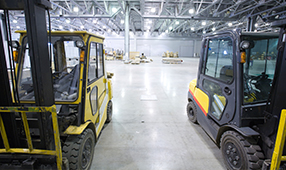Home » Tips & Advice » Forklift Leasing
Forklift Leasing
Forklift Leasing

If you are thinking about entering an agreement for forklift leasing, it is crucial that you first determine if this is the best path for you to take. In a nutshell, this kind of contract involves a lender (lessor), the person who purchases the machine and lends it on a loan to the client (lessee) for an agreed-upon set of time. Depending on the agreement, you can either make a full payment or make scheduled payments to the lender. There are also some lenders who allow lessees to buy the equipment or return it as a form of final payment at the end of the contract term.
There are quite a number of leasing options, so make sure that you explore each one to find out if this is better for your particular situation or if buying a new or used machine is more ideal. One way to expedite your decision-making process is to educate yourself on the major factors to be considered when renting out a forklift, as renting is quite similar to leasing. These include the following:
1. Conditions
In what conditions will you be using the forklift truck? You need to get this answered as this will help you determine the best size and features of the lift that you should get. Say for instance, if you are going to operate the truck in an area with narrower aisles, a small and narrow electric lift may be the best choice. If the equipment will be driven on rough terrain (outdoors), a diesel lift equipped with pneumatic tires is more ideal.
2. Frequency of Use
How frequently will you be operating the truck? How many hours in a day will you have to run the equipment? Again, these are critical questions to ask yourself, as it will help you decide whether entering a forklift leasing contract is a wiser choice or if it will be better if you just rent the equipment.
Keep in mind that the more hours you put in the machine, the shorter its lifespan becomes, which may then result in it having the need for major repairs in a quicker span of time. Major repairs are expensive, and the costs associated with them may be greater if the equipment is only on lease. You should also consider alternatives to leasing. If you only need it for a shorter period of time, renting may be better. If you are unsure of how long you will have the need for such piece of equipment, you may also want to take a look into getting a loan for buying the unit.
3. The Capacity of the Forklift
One of the biggest factors influencing the rates associated with forklift leasing is the capacity of the equipment. Generally, capacity is expressed in pounds or kilograms, a number that pertains to the overall weight the machine can safely accommodate and handle. In industry standards, the lowest capacity is 3,000 pounds (1,361 kg). You will also find machines that are capable of safely and securely handling loads of up to 8,000 pounds (3,629 kg). You will also find forklift trucks that have much higher capacities, but of course, these are more expensive since they use more innovative engineering and technological features.
4. The Type of Engine the Equipment Uses
The type of engine that powers the forklift truck is another contributor to the rates associated with its lease. In most cases, an electric-powered machine costs more than a fossil fuel engine-using truck. However, you should know that the former is more cost-effective, since you do not have to worry about buying fuel and it generally is cheaper to maintain. In addition, electric forklift trucks are more highly recommended for applications involving fully-enclosed environments.
5. Other Cost-Influencing Factors
Other important considerations before getting into a forklift leasing contract include brand, condition, additional accessories and attachments, as well as operating capabilities. Your credit score and standing is also a major player in how much you will be charged by the lessor, as leasing a forklift truck is almost the same as taking out any kind of loan.
